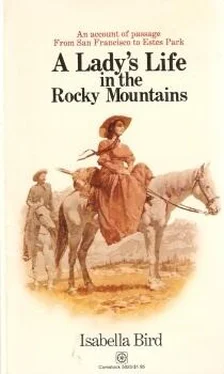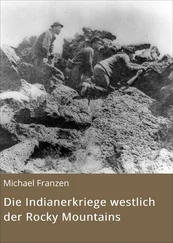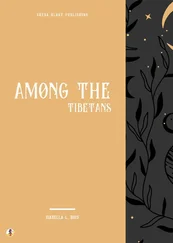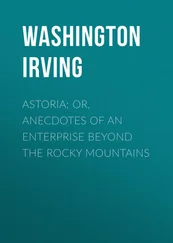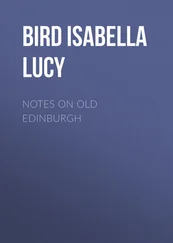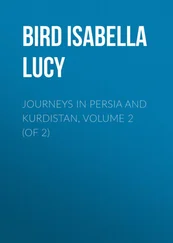The solitude was becoming somber, when, after driving for nine hours, and traveling at the least forty-five miles, without any sign of fatigue on the part of the broncos , we came to a stream, by the side of which we drove along a definite track, till we came to a sort of tripartite valley, with a majestic crooked canyon 2,000 feet deep opening upon it. A rushing stream roared through it, and the Rocky Mountains, with pines scattered over them, came down upon it. A little farther, and the canyon became utterly inaccessible. This was exciting; here was an inner world. A rough and shaky bridge, made of the outsides of pines laid upon some unsecured logs, crossed the river. The broncos stopped and smelt it, not liking it, but some encouraging speech induced them to go over. On the other side was a log cabin, partially ruinous, and the very rudest I ever saw, its roof of plastered mud being broken into large holes. It stood close to the water among some cotton-wood trees. A little higher there was a very primitive saw-mill, also out of repair, with some logs lying about. An emigrant wagon and a forlorn tent, with a camp-fire and a pot, were in the foreground, but there was no trace of the boarding-house, of which I stood a little in dread. The driver went for further directions to the log cabin, and returned with a grim smile deepening the melancholy of his face to say it was Mr. Chalmers', but there was no accommodation for such as him, much less for me! This was truly "a sell." I got down and found a single room of the rudest kind, with the wall at one end partially broken down, holes in the roof, holes for windows, and no furniture but two chairs and two unplaned wooden shelves, with some sacks of straw upon them for beds. There was an adjacent cabin room, with a stove, benches, and table, where they cooked and ate, but this was all. A hard, sad-looking woman looked at me measuringly. She said that they sold milk and butter to parties who camped in the canyon, that they had never had any boarders but two asthmatic old ladies, but they would take me for five dollars per week if I "would make myself agreeable." The horses had to be fed, and I sat down on a box, had some dried beef and milk, and considered the matter. If I went back to Fort Collins, I thought I was farther from a mountain life, and had no choice but Denver, a place from which I shrank, or to take the cars for New York. Here the life was rough, rougher than any I had ever seen, and the people repelled me by their faces and manners; but if I could rough it for a few days, I might, I thought, get over canyons and all other difficulties into Estes Park, which has become the goal of my journey and hopes. So I decided to remain.
September 16.
Five days here, and I am no nearer Estes Park. How the days pass I know not; I am weary of the limitations of this existence. This is "a life in which nothing happens." When the buggy disappeared, I felt as if I had cut the bridge behind me. I sat down and knitted for some time — my usual resource under discouraging circumstances. I really did not know how I should get on. There was no table, no bed, no basin, no towel, no glass, no window, no fastening on the door. The roof was in holes, the logs were unchinked, and one end of the cabin was partially removed! Life was reduced to its simplest elements. I went out; the family all had something to do, and took no notice of me. I went back, and then an awkward girl of sixteen, with uncombed hair, and a painful repulsiveness of face and air, sat on a log for half an hour and stared at me. I tried to draw her into talk, but she twirled her fingers and replied snappishly in monosyllables. Could I by any effort "make myself agreeable"? I wondered. The day went on. I put on my Hawaiian dress, rolling up the sleeves to the elbows in an "agreeable" fashion. Towards evening the family returned to feed, and pushed some dried beef and milk in at the door. They all slept under the trees, and before dark carried the sacks of straw out for their bedding. I followed their example that night, or rather watched Charles's Wain while they slept, but since then have slept on blankets on the floor under the roof. They have neither lamp nor candle, so if I want to do anything after dark I have to do it by the unsteady light of pine knots. As the nights are cold, and free from bugs, and I do a good deal of manual labor, I sleep well. At dusk I make my bed on the floor, and draw a bucket of ice-cold water from the river; the family go to sleep under the trees, and I pile logs on the fire sufficient to burn half the night, for I assure you the solitude is eerie enough. There are unaccountable noises, (wolves), rummagings under the floor, queer cries, and stealthy sounds of I know not what. One night a beast (fox or skunk) rushed in at the open end of the cabin, and fled through the window, almost brushing my face, and on another, the head and three or four inches of the body of a snake were protruded through a chink of the floor close to me, to my extreme disgust. My mirror is the polished inside of my watchcase. At sunrise Mrs. Chalmers comes in — if coming into a nearly open shed can be called in — and makes a fire, because she thinks me too stupid to do it, and mine is the family room; and by seven I am dressed, have folded the blankets, and swept the floor, and then she puts some milk and bread or stirabout on a box by the door. After breakfast I draw more water, and wash one or two garments daily, taking care that there are no witnesses of my inexperience. Yesterday a calf sucked one into hopeless rags. The rest of the day I spend in mending, knitting, writing to you, and the various odds and ends which arise when one has to do all for oneself. At twelve and six some food is put on the box by the door, and at dusk we make up our beds. A distressed emigrant woman has just given birth to a child in a temporary shanty by the river, and I go to help her each day.
I have made the acquaintance of all the careworn, struggling settlers within a walk. All have come for health, and most have found or are finding it, even if they have not better shelter than a wagon tilt or a blanket on sticks laid across four poles. The climate of Colorado is considered the finest in North America, and consumptives, asthmatics, dyspeptics, and sufferers from nervous diseases, are here in hundreds and thousands, either trying the "camp cure" for three or four months, or settling here permanently. People can safely sleep out of doors for six months of the year. The plains are from 4,000 to 6,000 feet high, and some of the settled "parks," or mountain valleys, are from 8,000 to 10,000. The air, besides being much rarefied, is very dry. The rainfall is far below the average, dews are rare, and fogs nearly unknown. The sunshine is bright and almost constant, and three-fourths of the days are cloudless. The milk, beef, and bread are good. The climate is neither so hot in summer nor so cold in winter as that of the States, and when the days are hot the nights are cool. Snow rarely lies on the lower ranges, and horses and cattle don't require to be either fed or housed during the winter. Of course the rarefied air quickens respiration. All this is from hearsay. [10] The curative effect of the climate of Colorado can hardly be exaggerated. In traveling extensively through the Territory afterwards I found that nine out of every ten settlers were cured invalids. Statistics and medical workers on the climate of the State (as it now is) represent Colorado as the most remarkable sanatorium in the world.
I am not under favorable circumstances, either for mind or body, and at present I feel a singular lassitude and difficulty in taking exercise, but this is said to be the milder form of the affliction known on higher altitudes as soroche , or "mountain sickness," and is only temporary. I am forming a plan for getting farther into the mountains, and hope that my next letter will be more lively. I killed a rattlesnake this morning close to the cabin, and have taken its rattle, which has eleven joints. My life is embittered by the abundance of these reptiles — rattlesnakes and moccasin snakes, both deadly, carpet snakes and "green racers," reputed dangerous, water snakes, tree snakes, and mouse snakes, harmless but abominable. Seven rattlesnakes have been killed just outside the cabin since I came. A snake, three feet long, was coiled under the pillow of the sick woman. I see snakes in all withered twigs, and am ready to flee at "the sound of a shaken leaf." And besides snakes, the earth and air are alive and noisy with forms of insect life, large and small, stinging, humming, buzzing, striking, rasping, devouring!
Читать дальше
